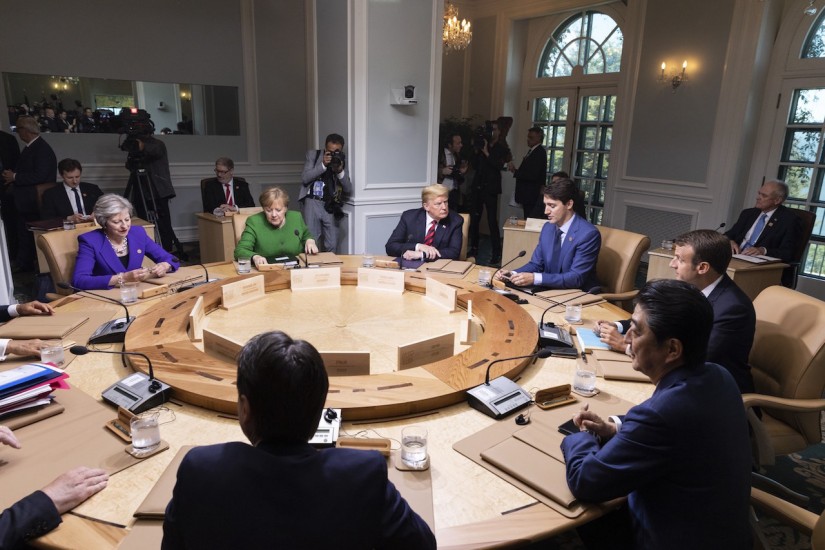Flames may as well have erupted in the White House for a second time in its history last month when President Trump, in a heated phone call with Canadian Prime Minister Justin Trudeau, invoked the burning of the Executive Mansion by British forces during the War of 1812. The call came as Trump started to impose tariffs on Canada in the name of national security, a move he reinforced last week with attacks on Trudeau after the latter objected to the tariffs during a tumultuous Group of Seven summit in Quebec.
But when it comes both to the war and to national-security threats, Trump has gotten Canada all wrong. First, he erred in painting the United States as the victim of the War of the 1812. In reality, it was the United States that began the war by launching an invasion of Canada, not the other way around. British soldiers set ablaze much of Washington in 1814 — but only in retaliation for U.S. soldiers burning the Upper Canadian capital building in present-day Toronto.
And in fact, the actual history of the war reveals that Trump’s trade policies are deeply misguided as well. By attempting to impose steel tariffs against Canada in the name of national security, Trump is repeating the very mistakes that led to the War of 1812 in the first place. The difference: This time it is the people of the United States who will get burned, rather than the White House. In the early 1800s, it was Thomas Jefferson who boxed himself in with economic sanctions against the Canada. He saw it as a way to pressure the British Empire into respecting the rights of American merchants and sailors to freely pursue foreign trade.
Following the outbreak of the wars of the French Revolution in 1793, American citizens found themselves targeted by both the British and French navies, as the conflict between the two nations spilled into the Western Hemisphere. The French were determined to protect their revolution at home and export it abroad; Britons were determined to defend the world from the violent excesses of the Jacobin terror and, after 1803, the tyranny of Napoleon Bonaparte. Both sides were determined to close off their rival’s foreign trade, because it offered their enemies a lifeline from starvation and defeat.
American merchants and sailors found themselves caught in the middle of this global conflict, one in which the United States had tried to avoid picking sides. After the British navy’s decisive victory over a Franco-Spanish fleet at the Battle of Trafalgar in 1805, the British seized an increasing number of American ships and sailors in their efforts to devastate the French economy. With the United States unprepared for war, Jefferson set upon using a trade embargo in an attempt to leverage America’s economic power to force Britain to recognize U.S. sovereignty at sea.
But the embargo proved politically disastrous for the president and economically catastrophic for ordinary Americans. While Jefferson and his secretary of state, James Madison, believed they were protecting the livelihood of American workers, closing foreign trade merely led to mass unemployment among sailors and hard times for farmers denied access to overseas markets. Voters punished this blunder. Madison, who succeeded Jefferson in 1809, watched helplessly as his supporters in Congress suffered heavy losses at the ballot box in the 1810 midterm elections.
With economic sanctions discredited, political infighting in his party and the British still targeting American ships and sailors, Madison was left with few alternatives but to ask Congress to declare war on Britain in 1812.
While Jefferson and Madison’s moves were unquestionably blunders that damaged the U.S. economy, hurt their political party and led to a war, they were a response to real national-security concerns.
Americans have always lived in a global economy. Jefferson and Madison recognized the power of commerce to bring together people and nations through mutual interest and free trade. The Jeffersonian vision of an expanding “Empire of Liberty” depended on commerce as a vehicle of western expansion. As Americans colonized the western continent by turning Native American homelands into farmland, the U.S. government needed to ensure that they had access to overseas markets where they could sell their produce. The capture of American ships and the forced impressment of American sailors into the British navy, then, did not just threaten the bottom line of wealthy merchants or the freedom of mariners, but the future survival of the United States.
Trump, whose national-security claims are far more dubious, would do well to learn the political lessons from the Jefferson embargo. Far from protecting American jobs from unfair foreign competition, Trump’s misguided tariffs actually threaten the livelihood of U.S. workers — who will ultimately pay the price when Canadian reprisals affect a cross-border trade that is worth almost $600 billion a year. This doesn’t have to happen. Trump can rescind his damaging tariffs and instead devote his energies toward investing in the infrastructure of the U.S. economy to boost Americans workers and manufacturers.
The War of 1812 revealed that tariffs are ultimately self-defeating. Economic warfare will exact a heavy political price at home, while also alienating the United States’ staunchest allies abroad during a period of grave geopolitical instability.
History will be much kinder to Jefferson and Madison, who grappled with intractable national-security challenges in good faith, than it will to a president who needlessly brought these calamities upon himself and the nation.
